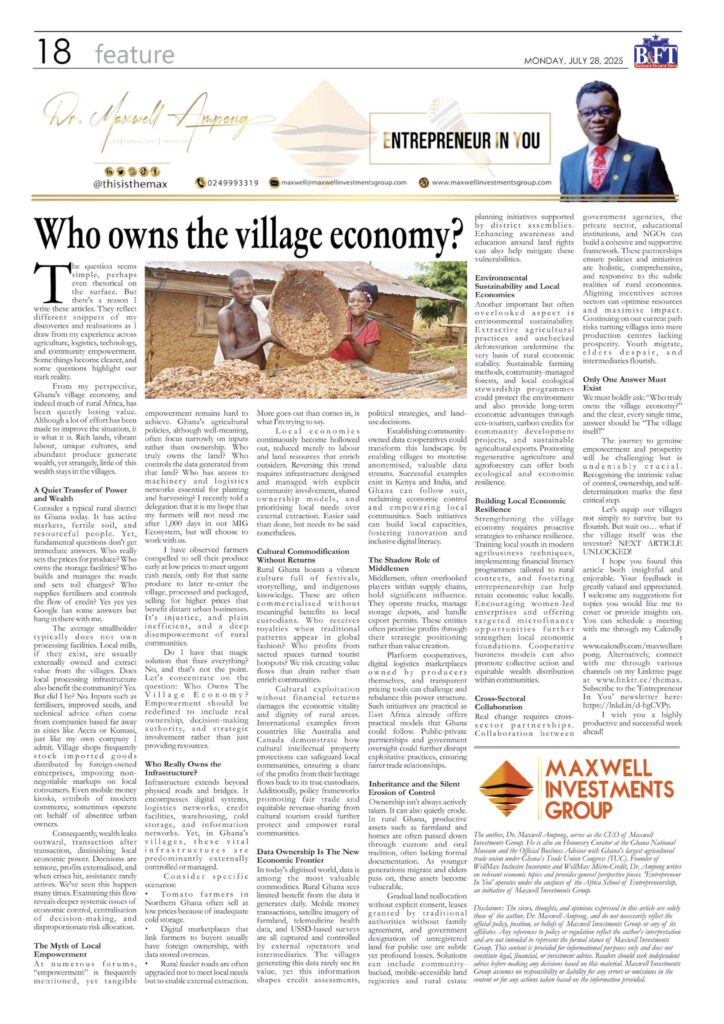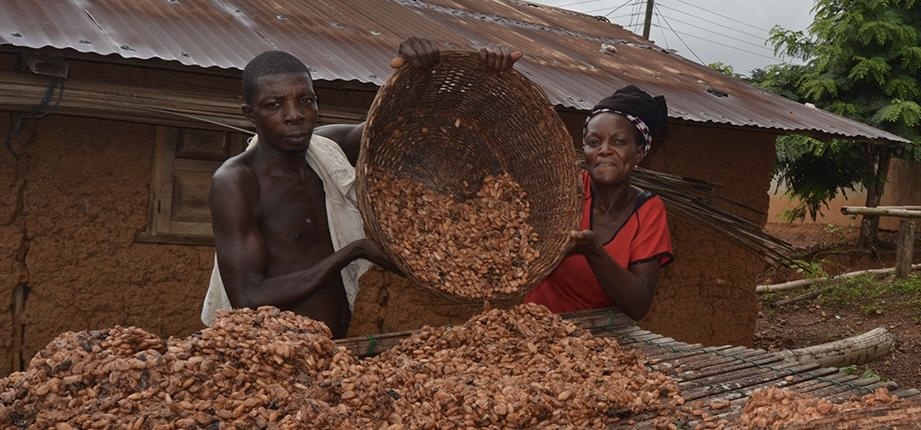
The question seems simple, perhaps even rhetorical on the surface. But there’s a reason I write these articles. They reflect different snippets of my discoveries and realisations as I draw from my experience across agriculture, logistics, technology, and community empowerment. Some things become clearer, and some questions highlight our stark reality.
From my perspective, Ghana’s village economy, and indeed much of rural Africa, has been quietly losing value. Although a lot of effort has been made to improve the situation, it is what it is. Rich lands, vibrant labour, unique cultures, and abundant produce generate wealth, yet strangely, little of this wealth stays in the villages.
A Quiet Transfer of Power and Wealth
Consider a typical rural district in Ghana today. It has active markets, fertile soil, and resourceful people. Yet, fundamental questions don’t get immediate answers. Who really sets the prices for produce? Who owns the storage facilities? Who builds and manages the roads and sets toll charges? Who supplies fertilisers and controls the flow of credit? Yes yes yes Google has some answers but hang in there with me.
The average smallholder typically does not own processing facilities. Local mills, if they exist, are usually externally owned and extract value from the villages. Does local processing infrastructure also benefit the community? Yes. But did I lie? No. Inputs such as fertilisers, improved seeds, and technical advice often come from companies based far away in cities like Accra or Kumasi, just like my own company I admit. Village shops frequently stock imported goods distributed by foreign-owned enterprises, imposing non-negotiable markups on local consumers. Even mobile money kiosks, symbols of modern commerce, sometimes operate on behalf of absentee urban owners.
Consequently, wealth leaks outward, transaction after transaction, diminishing local economic power. Decisions are remote, profits externalised, and when crises hit, assistance rarely arrives. We’ve seen this happen many times. Examining this flow reveals deeper systemic issues of economic control, centralisation of decision-making, and disproportionate risk allocation.
The Myth of Local Empowerment
At numerous forums, “empowerment” is frequently mentioned, yet tangible empowerment remains hard to achieve. Ghana’s agricultural policies, although well-meaning, often focus narrowly on inputs rather than ownership. Who truly owns the land? Who controls the data generated from that land? Who has access to machinery and logistics networks essential for planting and harvesting? I recently told a delegation that it is my hope that my farmers will not need me after 1,000 days in our MIG Ecosystem, but will choose to work with us.
I have observed farmers compelled to sell their produce early at low prices to meet urgent cash needs, only for that same produce to later re-enter the village, processed and packaged, selling for higher prices that benefit distant urban businesses. It’s injustice, and plain inefficient, and a deep disempowerment of rural communities.
Do I have that magic solution that fixes everything? No, and that’s not the point. Let’s concentrate on the question: Who Owns The Village Economy? Empowerment should be redefined to include real ownership, decision-making authority, and strategic involvement rather than just providing resources.
Who Really Owns the Infrastructure?
Infrastructure extends beyond physical roads and bridges. It encompasses digital systems, logistics networks, credit facilities, warehousing, cold storage, and information networks. Yet, in Ghana’s villages, these vital infrastructures are predominantly externally controlled or managed.
Consider specific scenarios:
- Tomato farmers in Northern Ghana often sell at low prices because of inadequate cold storage.
- Digital marketplaces that link farmers to buyers usually have foreign ownership, with data stored overseas.
- Rural feeder roads are often upgraded not to meet local needs but to enable external extraction. More goes out than comes in, is what I’m trying to say.
Local economies continuously become hollowed out, reduced merely to labour and land resources that enrich outsiders. Reversing this trend requires infrastructure designed and managed with explicit community involvement, shared ownership models, and prioritising local needs over external extraction. Easier said than done, but needs to be said nonetheless.
Cultural Commodification Without Returns
Rural Ghana boasts a vibrant culture full of festivals, storytelling, and indigenous knowledge. These are often commercialised without meaningful benefits to local custodians. Who receives royalties when traditional patterns appear in global fashion? Who profits from sacred spaces turned tourist hotspots? We risk creating value flows that drain rather than enrich communities.
Cultural exploitation without financial returns damages the economic vitality and dignity of rural areas. International examples from countries like Australia and Canada demonstrate how cultural intellectual property protections can safeguard local communities, ensuring a share of the profits from their heritage flows back to its true custodians. Additionally, policy frameworks promoting fair trade and equitable revenue-sharing from cultural tourism could further protect and empower rural communities.
Data Ownership Is The New Economic Frontier
In today’s digitised world, data is among the most valuable commodities. Rural Ghana sees limited benefit from the data it generates daily. Mobile money transactions, satellite imagery of farmland, telemedicine health data, and USSD-based surveys are all captured and controlled by external operators and intermediaries. The villages generating this data rarely see its value, yet this information shapes credit assessments, political strategies, and land-use decisions.
Establishing community-owned data cooperatives could transform this landscape by enabling villages to monetise anonymised, valuable data streams. Successful examples exist in Kenya and India, and Ghana can follow suit, reclaiming economic control and empowering local communities. Such initiatives can build local capacities, fostering innovation and inclusive digital literacy.
The Shadow Role of Middlemen
Middlemen, often overlooked players within supply chains, hold significant influence. They operate trucks, manage storage depots, and handle export permits. These entities often prioritise profits through their strategic positioning rather than value creation.
Platform cooperatives, digital logistics marketplaces owned by producers themselves, and transparent pricing tools can challenge and rebalance this power structure. Such initiatives are practical as East Africa already offers practical models that Ghana could follow. Public-private partnerships and government oversight could further disrupt exploitative practices, ensuring fairer trade relationships.
Inheritance and the Silent Erosion of Control
Ownership isn’t always actively taken. It can also quietly erode. In rural Ghana, productive assets such as farmland and homes are often passed down through custom and oral tradition, often lacking formal documentation. As younger generations migrate and elders pass on, these assets become vulnerable.
Gradual land reallocation without explicit consent, leases granted by traditional authorities without family agreement, and government designation of unregistered land for public use are subtle yet profound losses. Solutions can include community-backed, mobile-accessible land registries and rural estate planning initiatives supported by district assemblies. Enhancing awareness and education around land rights can also help mitigate these vulnerabilities.
Environmental Sustainability and Local Economies
Another important but often overlooked aspect is environmental sustainability. Extractive agricultural practices and unchecked deforestation undermine the very basis of rural economic stability. Sustainable farming methods, community-managed forests, and local ecological stewardship programmes could protect the environment and also provide long-term economic advantages through eco-tourism, carbon credits for community development projects, and sustainable agricultural exports. Promoting regenerative agriculture and agroforestry can offer both ecological and economic resilience.
Building Local Economic Resilience
Strengthening the village economy requires proactive strategies to enhance resilience. Training local youth in modern agribusiness techniques, implementing financial literacy programmes tailored to rural contexts, and fostering entrepreneurship can help retain economic value locally. Encouraging women-led enterprises and offering targeted microfinance opportunities further strengthen local economic foundations. Cooperative business models can also promote collective action and equitable wealth distribution within communities.
Cross-Sectoral Collaboration
Real change requires cross-sector partnerships. Collaboration between government agencies, the private sector, educational institutions, and NGOs can build a cohesive and supportive framework. These partnerships ensure policies and initiatives are holistic, comprehensive, and responsive to the subtle realities of rural economies. Aligning incentives across sectors can optimise resources and maximise impact. Continuing on our current path risks turning villages into mere production centres lacking prosperity. Youth migrate, elders despair, and intermediaries flourish.
Only One Answer Must Exist
We must boldly ask: “Who truly owns the village economy?” and the clear, every single time, answer should be “The village itself!”
The journey to genuine empowerment and prosperity will be challenging but is undeniably crucial. Recognising the intrinsic value of control, ownership, and self-determination marks the first critical step.
Let’s equip our villages not simply to survive but to flourish. But wait oo… what if the village itself was the investor? NEXT ARTICLE UNLOCKED! 🗝
I hope you found this article both insightful and enjoyable.
Subscribe to the ‘Entrepreneur In You’ newsletter here: https://lnkd.in/d-hgCVPy.
I wish you a highly productive and successful week ahead!
♕ —- ♕ —- ♕ —- ♕ —- ♕
Disclaimer: The views, thoughts, and opinions expressed in this article are solely those of the author, Dr. Maxwell Ampong, and do not necessarily reflect the official policy, position, or beliefs of Maxwell Investments Group or any of its affiliates. Any references to policy or regulation reflect the author’s interpretation and are not intended to represent the formal stance of Maxwell Investments Group. This content is provided for informational purposes only and does not constitute legal, financial, or investment advice. Readers should seek independent advice before making any decisions based on this material. Maxwell Investments Group assumes no responsibility or liability for any errors or omissions in the content or for any actions taken based on the information provided.


